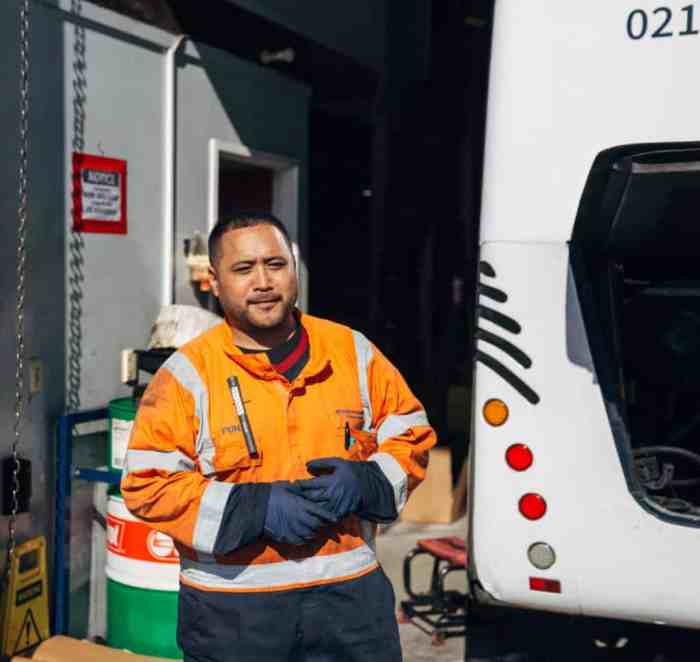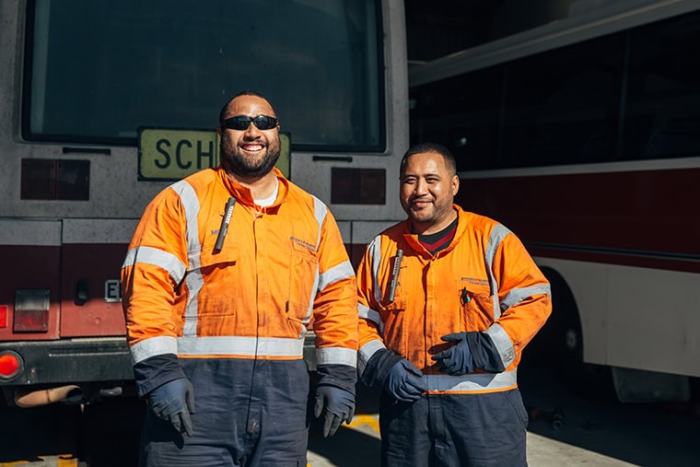If there’s one thing your boss wants you to bring to work from day one, it’s a great attitude. Your ‘A’ game! But how do you get one? For many of our trainees, it’s about taking an honest look at what they say and do – plus doing some simple things that show they’re keen to learn. Here, we look at practical ways to impress your boss and do well in the workplace.
Bringing a positive, motivated attitude to the mahi will not only help you get hired and score an apprenticeship, it can also help you get promoted in the future and get great references when you decide to change jobs. Your employer will see you are present at work and interested in the job.
MPTT navigator Hami Chapman works with tauira to help them get work-ready, which includes having the right attitude. He says improving your attitude means doing some thinking and being open to how you might need to change.
“As navigators, we often see subtle changes in our tauira’s attitude after we work with them. We encourage the tauira to look in a mirror to identify what needs changing, then work out what that change could look like. Sometimes it’s like seeing a lightbulb come on in their heads.”
To help show the importance of attitude, one exercise navigators do with tauira is to assign each letter of the alphabet a number (A = 1, B = 2, etc) and add up the value of the word ‘attitude’, says Hami.
“What they find is that the letter values add up to 100. We tell them, this is what employers want to see… 100% attitude.”

So what does it mean to have a great attitude, and how do you know if you have one? The bad news is, no one can do it for you – a good attitude comes from within. But the good news is, it’s simpler than you might think.
Show up
Whether it’s your interview or your first day on the job, the best way to get things off to a good start is to show up on time.
Mark Katterns, project director at Hawkins Construction, says showing up on time each day is the key to doing well in the trades industry.
“To succeed, you need the work ethic. If you’re not on that waka, then you might as well not come. You’ve got to be there ready to work at 7am and not looking to finish work early – we leave at 4:30pm, no sooner.”
What to do
- Aim to show up on site at least 10 minutes early, so you’re less likely to be late if something unexpected happens on the way, like traffic being worse than usual.
- Don’t pack up early or be the first to leave every day. Keep working until it’s time to stop, and ask your boss if there’s anything that needs to be done before you leave. This shows you’re keen and wanting to do the work.
Ask questions
Your boss wants to see you’re motivated to learn, and one of the best ways to show that is to ask questions.
It can feel uncomfortable to put yourself out there and ask a question, but it’s worth the effort, says qualified mechanical engineer and MPTT graduate George Patterson.
“It was hard to put my hand up and say, ‘Can you please explain that and slow it down for me?’ That’s what you have to learn to do though.
“When things get hard, just ask. I feel like that’s a big thing for Pacific Islanders — we’re shy about asking questions, asking for help, speaking up. There’s never a dumb question. Always remember that you’re an apprentice and you’re still learning.”
George’s boss, Ian Norton, says having an employee who asks questions makes his job much easier, because then he knows if he needs to explain things further.
“The great thing with George is that if he doesn’t know something, he asks.”
What to do
- When your boss is explaining something to you, try to come up with at least one question you can ask. Asking questions helps you learn more.
- If you don’t know something, make sure you ask. This shows your boss they can trust you to speak up. Remember, your boss doesn’t expect you to know it all and they need to know if you don’t understand anything.
Take notes
It can be hard to remember everything your boss says. So, when they’re explaining how to do a job, try taking notes.
Dave Robb, Ritchies Murphy Transport Solutions workshop manager, says taking notes can help you stand out and shows you want to learn. This was what impressed him about Kamosi Finau and Puna Taruia, who came for work experience but ended up being offered apprenticeships.
“I brought in half a dozen students for an introduction to a real engineering worksite,” says Dave. “Some of the students were a bit cocky and some didn’t seem interested. But these two were writing things down and really taking notice.”
“It’s about attitude in this game — you don’t have to know anything, you just have to be really keen to learn.”
What to do
- Get a small notepad and pen and keep them in your pocket at work. That way, you can take notes whenever your boss tells you something new, or whenever you think of something you want to learn more about.
Stay busy
Another great way to show your positive attitude is to volunteer for work you haven’t been asked to do.
So, when you’re on site and you finish a task, make sure you look for something else to keep you busy, says automotive apprentice Kamosi Finau.
“You can never stand there with your hands in your pockets. You’ve got to always be watching the tools and the ways of doing things.”
What to do
- When you’re on site and you finish a task, don’t check your phone or stand there waiting for your boss to tell you what to do next – look around to see if anything needs tidying up or ask someone else on the team if they need help.
- Think you know what might need to be done next? Ask your boss if they want you to get started. Making a suggestion is better than just asking what they want you to do – even if you get it wrong. It shows you’ve thought about what might need doing, rather than just waiting to be told what to do.
Keep on top of your bookwork
If you’re in an apprenticeship, it’s important to work on your theory regularly.
Employer Eddie Green, who oversaw mechanical engineering apprentice Toni Rhind’s work at Pacific Steel, says staying up to date with your bookwork is useful to your boss. It helps you to be a good team member at work.
“Toni’s a role model. Her schoolwork and block course is always up to date. She adds a lot of value to our business and she’s always been outstanding.”
As an apprentice, George Patterson put off the theory work at first, but eventually found that keeping on top of his bookwork was much less stressful.
“Try not to leave things to the last minute, because that’s when you start panicking.”
What to do
- Set aside time each week for theory work. Doing the work in smaller chunks is much easier and less stressful than trying to find time to do it all at once later on.




































